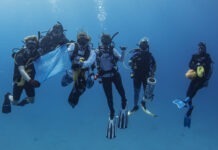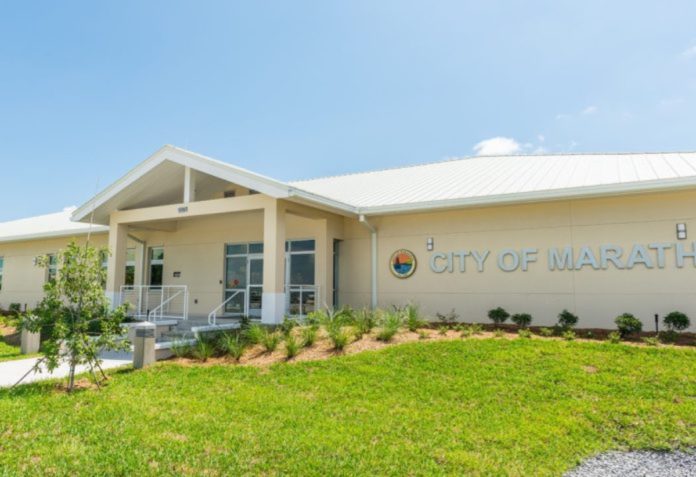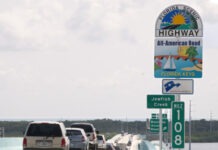Executives from Baptist Health South Florida showed up in force at the Marathon Council meeting on April 13. The new CEO of Fishermen’s Community Hospital and Mariners Hospital, Drew Grossman; Baptist Health South Florida board chairman Jay Hershoff; and a handful of others were there to encourage the council to renew the special taxing district.
“I got you your numbers to the city manager, I hope you realize, within 24 hours,” said Hershoff. He was referring to the March 9 meeting of Marathon City Council when council members reiterated a desire to see detailed information about Fishermen’s Hospital accounting data for treating uninsured and underinsured patients before renewing the special taxing district.
“We will get you these numbers every single quarter. It’s not a big deal, and had I known we were expected to be here (at last month’s meeting), I would have been. I promise that in the future, every single quarter, you will have this information which is the same information that goes to the county,” Hershoff said.
The council voted 4-1 (Councilman Mark Senmartin dissenting) to approve the Middle Keys Health Care Municipal Services Taxing Unit (MSTU) for another year. The taxing district was conceived in 2018 when it was clear that Fishermen’s Community Hospital was completely destroyed by Hurricane Irma and needed to be rebuilt. The City of Marathon officially supported the taxing district, which was then created by Monroe County.
Every year, the county cuts a check to Baptist — not for the cost of the rebuild, because that would have required a voter referendum, but the cost of treating the Middle Keys’ underinsured and uninsured — via the special taxing district. The district runs from MM 47 to MM 63, which includes Marathon, Key Colony Beach and Duck Key. The county said the goal was to raise about $10 million over 10 years.
Baptist Health South Florida has billed Monroe County $2,258,598 for services rendered since the taxing district was created. In the same period, the Monroe County Tax Collector has collected $1,905,082 from property owners in the district. The health system will only be repaid the $1.9 million, according to the laws governing the tax district.
Senmartin and Councilman John Bartus both asked questions of the Baptist Health executives. Bartus relayed a question from a constituent who asked for the definition of underinsured and learned it means patients who have a shortfall in Medicaid coverage. He also asked whether patients in the taxing district could expect to see a break on a hospital bill and was told that the hospital follows charity care guidelines tied to income. Senmartin said he was in favor of the hospital and praised the quality of care by Baptist, but asked for a more complete set of numbers — not only the losses incurred by the hospital but also the profits.
“Where are the income statements? How about the people that came (to Fishermen’s) and paid like they were supposed to? And there’s nothing in here about private donations,” Senmartin said.
Hershoff responded that a complete set of figures, including profit and loss, was provided to City Manager George Garrett. Councilman Steve Cook said those numbers were in the council’s digital agenda. (Those numbers were not in the regular agenda available to citizens.) Hershoff said, regardless, all those numbers are part of the public record via the Internal Revenue Service filings because Baptist Health is a non-profit.
Hershoff also told the council that Fishermen’s Hospital was the only rural hospital built in the United States in the past 10 to 15 years.
“We’ve done what we said we were going to do. I ask you to continue the taxing district,” Hershoff said.
Initially, the hospital construction was set to cost $40 million. Baptist Health executives told the council on April 13 that the total cost will be more like $43.7 million.
Initially, the hospital construction was set to cost $40 million. Baptist Health executives told the council on April 13 that the total cost will be more like $43.7 million. According to Baptist Health, the nonprofit has spent $57 million in the Middle Keys including the initial acquisition of the hospital, its debts and continued operation of the temporary facility. That does not count the $15 million raised philanthropically or the cost of dismantling the temporary hospital.
“We will be over $71 million invested in two months with losses continuing,” said Hershoff.
The hospital is set to open by June 2021.
The council also discussed raises for city council, Fourth of July festivities and passed a new irrigation law. To learn more, read the full story at keysweekly.com.
In other news:
- The council, voting 3-2 with Bartus and Senmartin dissenting, declined to give council members a pay raise from $18,000 (or $21,000 with no benefits) to $25,000 a year. Senmartin made the proposal, also suggesting it not take effect until the next election cycle, in order to attract “regular” citizens to run for office who might need the higher salary to compensate for lost time at their jobs. Councilmen Dan Zieg and Steve Cook said they wanted to honor the city’s original charter which paid councilmen nothing. Both spoke of donating their council salaries to charitable causes and the honor of serving.
Retired attorney Frank Greenman, also a founding father of the City of Marathon, told the council he supported the salary raise.
“Within the first 90 days after the city was created, we passed the ordinance for an $18,000 salary for Marathon council members. The idea was that the council of Key West and Islamorada were dominated by retired folks, and we didn’t want that for Marathon. We’re a working community and we want to encourage people to run. Right now the salaries of councilmen are .0036 percent of the entire budget. If you pass this raise, it will be .004 percent.”
- The City of Marathon approved moving forward with Fourth of July festivities at Sombrero Beach, provided that the COVID-19 pandemic doesn’t worsen in the Middle Keys.
- Mayor Luis Gonzalez nominated Chad Neller to sit on the code board currently being configured to serve in addition to the special magistrate. The board will have seven members total — with each councilman nominating a member and the other two agreed upon by the council as a whole.
- Bartus asked for council’s thoughts on amending Marathon’s Lobster Mini-Season rules to more closely resemble those of Key Colony Beach, the municipality with the most restrictive rules. The suggestion originated with the countywide taskforce that seeks to make rules uniform across the Keys for better enforcement.
- Zieg added a last-minute item to council discussion regarding the city’s IT department, just after the meeting was paused for a few minutes to work out audio issues. “Residents complain they can’t see or hear the meetings or our machinery fails. On our website, it still shows Michelle Coldiron as our mayor and meetings from 2018. It’s a very shabby product,” Zieg said. “What can we do?”
Garrett said he understood the council’s frustration and promised immediate action.
- The council passed two ordinances regarding water conservation — one with strict regulations regarding citizen irrigation, and another outlining the city’s water supply plan. Going forward, residents will only be able to water their lawns on certain days of the week based on street address, and could be subject to citations. Planning Director Brian Shea said the irrigation law would be enforced by the city’s own code officers, who would seek first to bring violators into compliance.



















